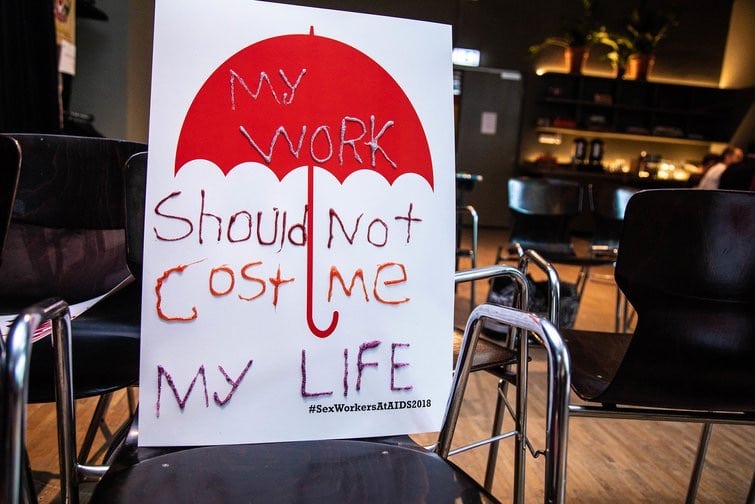Preventing violence and arrest in sex work in Rhode Island
On Wednesday, the Manhattan District Attorney announced it will no longer prosecute prostitution charges, and just last month the Queens District Attorney requested that 700 prostitution cases be dimissed. This begs the question–in Rhode Island, why do we arrest people doing sex work? I and many others have been trying to have this discussion since ‘closing the prostiution loophole’ became
April 22, 2021, 5:33 pm
By Nick Horton
On Wednesday, the Manhattan District Attorney announced it will no longer prosecute prostitution charges, and just last month the Queens District Attorney requested that 700 prostitution cases be dimissed. This begs the question–in Rhode Island, why do we arrest people doing sex work? I and many others have been trying to have this discussion since ‘closing the prostiution loophole’ became a cause célèbre in Rhode Island almost two decades ago.
America has long been hypocritical about sex work–calling people victims in one breath and criminals with another. The changes in New York could indicate a desire to start addressing that moral failure. Next Thursday, April 29, at 6pm, the panel discussion “Preventing Violence and Arrest in Sex Work in Rhode Island,” will challenge us to confront this topic once again.
The Panelists
Keynote Speaker Professor Manisha Shah will discuss her research specifically into the singular legacy of Rhode Island’s infamous prostitution loophole, which partially decriminalized indoor sex work up until 2009. Professor Shah used Rhode Island’s experiment to investigate the impacts of this decriminalization and found, amongst other results, that female gonorrhea rates went down by around 40% and rape went down by around 30% due to the ‘loophole.’
Ashley Perry is an Intervention Case Manager at Weber/Renew, an agency that specializes on providing services and support to people in sex work. She will provide insight into the challenging experiences of people doing sex work.
The Rhode Island Attorney General’s Office plays a critical role in how prostitution laws are enforced, and Deputy Attorney General Adi Goldstein will join the panel to share this perspective.
You can register for the free event here. This discussion is the second in OpenDoors’ series of webinars on reducing the incarceration of women in Rhode Island.

The Backstory
For many years, Rhode Island was the only state in the country that did not entirely criminalize sex work. As detailed in the excellent 2017 article ‘Prostitution Decriminalized: Rhode Island’s Experiment”, this came about largley by accident when RI’s laws we rewritten in the 1970’s. The loophole meant that while sex work outdoors, pimping, and operating a sex work business were all illegal, the actual act of selling consensual sex for money indoors was not. No one really noticed until the early 2000’s, when a series of criminal cases made this discrepancy crystal clear and ultimately caused a renewed public attention to indoor sex work in the state–largely focusing on message parlors.
Seeking Salvation Through Criminalization
I was directing our criminal justice policy work at OpenDoors in 2008 when it became clear that the tense compromise of this unintentional decriminalization would no longer hold. Legislation to ‘close the loophole’ became a major priority at the Statehouse. Legislator after legislator passionately proclaimed how much they wanted to protect the victims–sex workers of all types, and most importantly victims of sex-trafficking. People that didn’t want massage parlors in their neighborhoods were also part of the furor.
OpenDoors, RENEW, DARE, and many other local organizations had long emphasized how much we needed to help people trapped unwittingly in sex work, through poverty, trauma, and addiction. That priority was drowned out by one overwhelming battle cry— ‘people are being sex-trafficked and the only way to help them is to arrest them!’ State Police Superintendent Col. Brendan Doherty stated at the time: “If we allow this to continue the real losers are prostitutes.”
I remember debate after debate where we tried to unpack and push back against this argument, in conversations with the US Attorney’s Office, Professor Donna Hughes of URI (the leading anti-sex trafficking proponent in the state at the time), Providence officials, RI Legislators, and the media. We were told by the US Attorney’s Office and other law enforcement that the only way for them to prosecute sex trafficking cases was if the act of sex work indoors was itself illegal. We were told by Professor Hughes that sex trafficking was rampant amongst many venues across RI but the police couldn’t stop it because of the loophole. Along side messages of compassion was what often seemed, atleast to myself, the true power behind the campaign–the judgement that prostitution was bad and should disappear from view. Colonel David Neil of the State Police stated after the bill’s passage: “The most positive thing we can all hope for is the eradication of prostitution and all the negative things it brings with it. I think it goes to show the youth of Rhode Island that it is a crime. It is not a profession and it will not be tolerated.”
“We Don’t Have Power”
In all the outcry professing to care about sex workers, the people Rhode Island did not hear from were sex workers. As advocates we did our best at the time to try to bring their experiences into the debate. OpenDoors worked with RENEW to publish a policy report ‘Rethinking Arrest: Street Prostitution and Public Policy in Rhode Island.’ Tara Hurley, a local film maker, spent years investigating the issue and the world of Korean message parlors for her documentary ‘Happy Endings’ (Her movie showed the faces of hundreds of Rhode Island men with black bars over their faces entering a parlor. Did they think the women were victims? Criminals?). Tara helped try to bring the stories of the women she met into the public–no one had bothered to ask them–and several ended up testifying against the legislation.
Prior to the bill passing we met with a room full of spa employees at a community conversation event at DARE, which was reported on by the Providence Journal in an article that began with the statement ‘One thing was for sure–all the women in the room were prostitutes.’ I remember that statement because it was so absurd–many of the women had specifically said they were offended by being called prostitutes because they didn’t actually have intercourse with customers. (You can still listen to interviews from after the meeting (1,2)) You can hear one woman saying, “They already made a law, they just give us warning, I think…We don’t have power, we don’t have power.”
Rhode Island ultimately ignored the pleas of the women we met that day, passing legislation which made indoor prostitution clearly a crime (due to the pushback, legislators did simultaneously make RI the only state to allow unlimited expungement of loitering for prostitution charges).
Out of Sight, Out of Mind
I don’t know the complete effect of closing the loophole. I doubt anyone followed up with those spa employees to see how their lives were affected. We’ve seen many articles since then about arrests, raids, and trafficking (1, 2, 3 and many articles I don’t want to link to that show the names and faces of women just arrested). I still do not believe the five women whose photos were printed in an article about a hotel sweep in 2019 were helped by being arrested. I still do not believe that the women in these articles that were victims of sex trafficking could only be helped because they could be arrested more easily. RI is once again grappling with this issue by considering a legislative study commission. The commission has been stalled since 2019–apparently the legislature thinks the issue is no longer worth deliberating now that sex work is a crime and indoor sex work venues are less publicy visible.
The panel discussion next Thursday will be a unique opportunity to pick up where we left off in 2009. Hopefully, even a small portion of the people that were demanding legislation in 2009 will be interested in hearing about what happened afterwards. There is evidence that it backfired.






